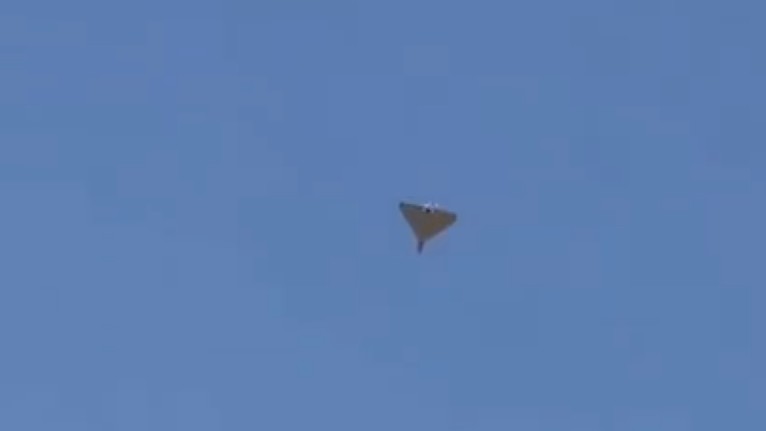Iran fired more than 100 drones towards Israel on Friday, hours after Israel bombed “dozens” of sites in the country, including its nuclear facilities, and killed senior military commanders and scientists.
Israeli army spokesperson Effie Defrin said in a statement that “all [aerial] defence arrays have been operating to intercept the threats.
“This is a different event to what we’ve experienced thus far, and we’re expecting difficult hours,” he added.
Jordan’s state news agency reported that it was intercepting a number of missiles and drones that had entered its airspace. Meanwhile, Israel’s public broadcaster reported that Israel began intercepting drones over Syria, while the country’s Channel 12 reported that its air force was intercepting UAVs over Saudi Arabia.
The flight-tracking website Flightradar24 showed that the skies over Israel, Jordan and Iraq were virtually empty at around 06:30 BST (08:30 local time), after all three countries closed their air space.
New MEE newsletter: Jerusalem Dispatch
Sign up to get the latest insights and analysis on
Israel-Palestine, alongside Turkey Unpacked and other MEE newsletters
Qatar Airlines said on Friday it had cancelled flights to Iran and Iraq, while Emirates Airlines said it had cancelled flights to countries including Iran, Iraq, Jordan and Lebanon.
Israel launched a major attack on Iran in the early hours of Friday, claiming it had taken the action because the Islamic Republic had begun to build nuclear warheads. Iran denies seeking to acquire nuclear weapons.
Israeli Prime Minister Benjamin Netanyahu said the attack was aimed at “rolling back the Iranian threat to Israel’s very survival,” adding that it would take “many days”.
“We struck at the heart of Iran’s nuclear enrichment programme,” Netanyahu said in a recorded televised address.
“We targeted Iran’s main enrichment facility in Natanz. We targeted Iran’s leading nuclear scientists working on the Iranian bomb. We also struck at the heart of Iran’s ballistic missile programme.”
Iranian media reported that explosions were reported in Natanz, the capital Tehran, and elsewhere; and that the head of the Revolutionary Guard, Hossein Salami, had been killed, as well as six scientists, including Fereydoun Abbasi and Mohammad Mehdi Tehranchi.
Abbasi was the head of the Atomic Energy Organisation from 2011 to 2013 and survived an assassination attempt in 2010. Tehranchi was a theoretical physicist. Both men appeared to have been targeted in their homes.
Iranian state television also reported that children had been killed in at least one of the air strikes, on a residential area of Tehran.
Nour News, reported several “loud explosions” in and around Tehran, adding that the country’s air defence system was on full alert, and all flights at Imam Khomeini international airport had been suspended.
‘Bitter, painful fate’
Shortly after the attacks, Iran’s Supreme Leader Ayatollah Ali Khamenei said Israel would face a “severe punishment” over the strikes, and confirmed that the military officials and scientists had been killed.
“With this crime, the Zionist regime has prepared for itself a bitter, painful fate, which it will definitely see,” Khamenei wrote on X.
Earlier, US Secretary of State Marco Rubio claimed that Washington was not involved in the strikes, but an Israeli official quoted by the Israeli state broadcaster Kan said that Israel fully coordinated its attack with the White House.
The unnamed official also told Kan that recent reports of rifts between Israel and Washington were false, but had not been denied as part of a media ruse to confuse Iran.

Israel launches major attack on Iran, senior IRGC chief and scientists killed
Read More »
On Wednesday, Iran’s Defence Minister Aziz Nasirzadeh had warned that his country would target US military bases in the region if nuclear talks break down and the US launches attacks.
Speaking to reporters late on Thursday, US President Donald Trump said he would “love to avoid the conflict” and suggested that Washington would prefer if Israel held off its attacks while negotiations continued.
“I want to have an agreement with Iran. We’re fairly close to an agreement… I’d much prefer an agreement,” Trump said.
“As long as I think there is an agreement, I don’t want them [the Israelis] going in because I think that would blow it – might help it actually, but it also could blow it.”
Following Friday’s attacks, Democratic Senator Chris Murphy said Israel’s decision to attack Iran was “intended to scuttle the Trump Administration’s negotiations” with Tehran and ignite “a regional war that will likely be catastrophic for America”.
Murphy said a war between Israel and Iran “may be good for Netanyahu’s domestic politics” but would likely be disastrous for “the rest of the region”.
“Iran would not be this close to possessing a nuclear weapon if Trump and Prime Minister Netanyahu had not forced America out of the nuclear agreement with Iran that had brought Europe, Russia, and China together behind the United States to successfully contain Iran’s nuclear ambitions,” he added.
The attacks come one day after the International Atomic Energy Agency (IAEA), the UN watchdog which monitors Iran’s nuclear programme, said that Iran was not complying with its nonproliferation obligations.
Iran said in response that it planned to open a new enrichment facility, and said the IAEA’s statement called into question the organisation’s credibility. Iran has long maintained that its nuclear programme is peaceful and denies seeking to acquire nuclear weapons.

